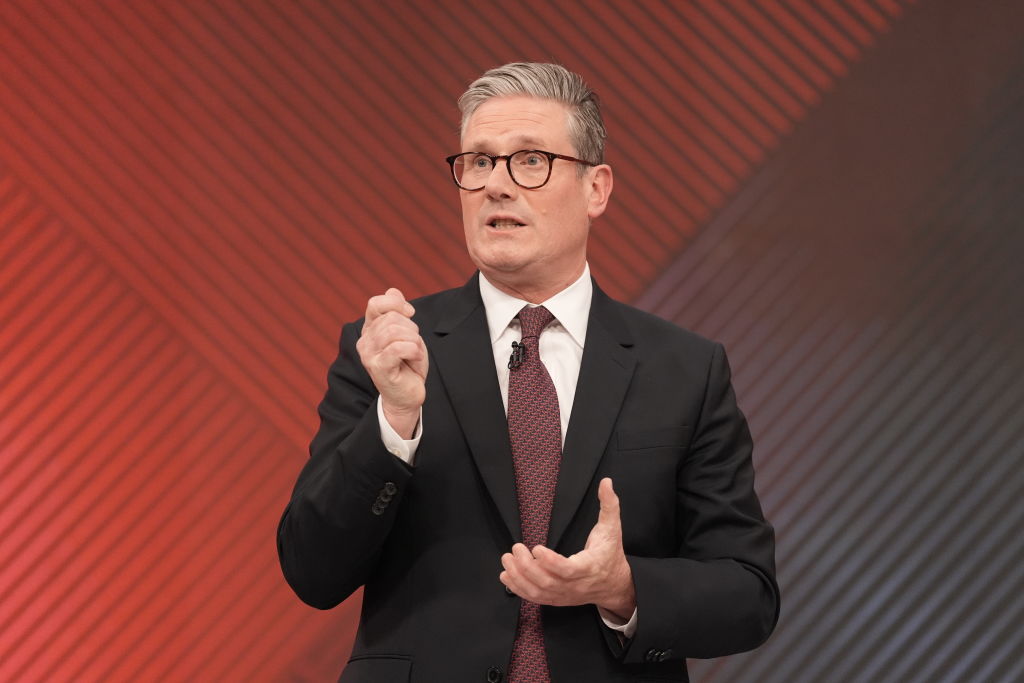Keir Starmer looked baffled by tonight’s questions. Rishi Sunak looked resigned. Separating the two candidates – having them face Beth Rigby and the audience, rather than each other – led to far more defensive performances: Starmer on tax, and Sunak on the Tory record. Both spent the majority of the time looking deeply uncomfortable.
Sunak did not have an easy ride. The audience, all warmed up by the Labour leader’s interview, was more likely to jump in and heckle. Asked questions about his ‘five promises’ made in January 2023 – only one of which he has made good on – Sunak tried to move the goalposts, insisting that those promises could not be solved ‘overnight’. Speaking specifically about bringing down the public debt (it’s kept rising these past 18 months), Sunak insisted ‘it was always meant to come down over time’. That’s a very different narrative to when Sunak asked the public to judge him on his record at the end of the year – last year – on debt, inflation, the economy, the NHS waitlists and immigration.
The audience didn’t seem to buy that Sunak was unaware of what his own manifesto would do to tax. The Prime Minister insisted that he wasn’t aware of any calculation that the tax burden would continue to rise in the next parliament, despite £17 billion worth of tax cuts. Be in no doubt: the tax burden does rise, thanks to freezes to tax thresholds. It’s the same problem the Tories have had selling their employee National Insurance cut: while certain taxes are going down, for millions of workers, their tax bill keeps rising. Tonight was clear evidence that Sunak is not fully prepared to address this on the national level.
But Sunak was not the only one to struggle. Asked repeatedly what taxes might rise under a Labour government, Starmer once again tried to keep his answer as vague as possible: insisting that ‘people are taxed too much already’ but also refusing to categorically rule out more tax rises. He did say changes to capital gains tax would not be in tomorrow’s manifesto – putting to rest speculation that hikes could be announced tomorrow. But ruling out specific taxes means every other tax is still at risk of a rise.
Was there a game-changing moment in tonight’s debates? No
Starmer is finding it increasingly difficult to avoid specific questions about tax. The audience rather surprisingly started to groan and shout this evening when he tried (multiple times) to pivot the conversation away from tax and towards his family upbringing. ‘I'm not going to sit here tonight and write the next five years of budgets.’ But when it comes to Labour, that is exactly what people want to know.
But tonight wasn’t just about tax. The audience Q&A included questions to both leaders about the NHS: both ruled out a 35 per cent pay rise for junior doctors, yet neither offered anything new in their plans to address NHS waiting lists or to settle public sector pay disputes. One young man in the audience pushed Sunak on his offer for the younger generations, asking why it was pensioners that got the ‘triple lock plus’ and a tax break, while 18 year-olds get mandatory, unpaid service.
A snap YouGov poll shows Keir Starmer comfortably winning tonight’s debate: 64 per cent to Sunak’s 36 per cent. This will have his team celebrating. But the first question he was asked tonight won’t be far from their thoughts. Perhaps the most powerful moment in the debate came at the start, when Starmer was asked what changed between his time supporting and campaigning for a Jeremy Corbyn government, and now. His answer was, curiously, not straight-forward. ‘When we lost the 2019 election, we lost very badly’ he said. ‘I concluded I should listen to the electorate.’ The suggestion was that it was the loss, not the ideas, that changed Starmer’s trajectory. There was no outright rejection of the policies and ideology underlining the Corbyn government. It’s a question he’ll want to have a stronger answer to next time.
Was there a game-changing moment in tonight’s debates? No – and that’s bad news for the Tories. But it was obvious from the start that there was no great love for either party in the audience. Plenty of frustration, lots of cynicism – and largely unsatisfied with most answers.







Comments